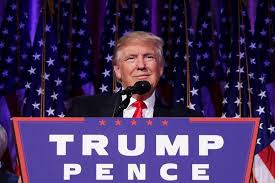It’s been less than a week since “President-elect” was placed before Donald Trump’s name in his stunning victory over Hillary Clinton, and among those asking how and why it happened is Kennesaw State Political Science Professor Kerwin Swint.
The short answer? “He did it by successfully tapping into a significant anti-establishment, anti-globalist anxiety that has been building among middle class and working class Americans for years,” Swint said. “It can also be seen partly as a repudiation of Obama-era policies, including the Affordable Care Act.”

Swint also offers a three-part version of the answer.
- This was a “change” election all along. It’s very difficult, almost unprecedented, for a political party to win three presidential elections in a row. The only modern instance of this happening was the GOP from 1980 to 1992, which saw Ronald Reagan elected to two terms followed by George H.W. Bush. Americans have tended to grow weary of one party controlling things for too long. Also significant are survey findings that over 60 percent of voters believe the country is on the wrong track — a recipe for the out-party to take back control of the White House.
- The unique nature of Donald Trump as a candidate. Love him or hate him, we’ve simply never seen a candidate like him in the 200-plus year history of this country. Before running for president, he was primarily known as a celebrity — first as a flashy, media-savvy business titan, then as a flashy, media-savvy TV personality. As a presidential candidate he was able to don the “outsider” label, becoming to many voters the anti-politician politician, willing to take on the political establishment, even the establishment of his own party. And then there is his style — brash, loud, boastful — and his “colorful” past. In a strange way, this inoculated him from some of the conventions and traditions of campaign communication.
- Hillary Clinton was a terrible candidate. In a change election, she reeked of the establishment, the status quo, business-as-usual. There is a reason that Bernie Sanders did so well in the Democratic primaries. That, coupled with her long history of controversies and scandals (real or imagined), severely limited her appeal to a large cross-section of voters. This was amplified by the email controversy and FBI Director Comey’s soul-searching melodrama. In the end, the simple truth is that not enough voters liked her or trusted her.
In every presidential election, Swint said, the candidates and their surrogates always claim that the current election is the most important election ever. “This time, they could be right.”

I couldn’t bring myself to vote for either as I believed the two major nominees were equally bad choices. I believe your analysis is much more accurate than a lot of the emotional reactions that have been given.
LikeLiked by 1 person
Thanks Byron for your comment! And, for reading OWL Perspective. We will pass your comment onto Dr. Swint.
LikeLike
Great synopsis of a complex and controversial election. Now we face the great unknown with Donald Trump since there has been no candidate and no president-elect like him. As a current KSU MBA student I am eager to see what’s next. After 8 years in the (outspoken and vigorous) opposition, can the republicans (many who also opposed DT) pivot and provide leadership to a fractured and “freaked out” (50%) electorate? Would love to hear professor Swint’s opinion on what a Donald Trump presidency will mean for America.
Jeff Richards
KSU-MBA(c) 8/2017
LikeLike
Thanks for your comments, Jeff! Your readership is much appreciated! We will circle back around with Dr. Swint to get an answer to your question, so stay tuned! 🙂
LikeLike
The analysis might be correct, except for one important detail: Secretary Clinton received over a million more votes than Donald Trump. The problem was in the strategy followed by the Democratic committee.
LikeLike
Thanks Ann for reading OWL Perspective and sharing your thoughts! 🙂 Please bookmark us for more KSU faculty expertise on timely topics!
LikeLike